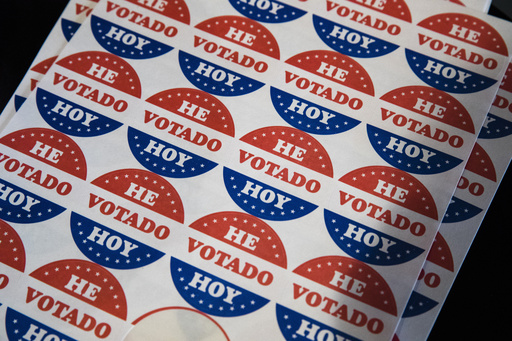
SAN FRANCISCO — As the presidential election rapidly approaches, Latino voters are encountering a significant influx of targeted political advertisements in Spanish, alongside a modern twist: chatbots disseminating unfounded information regarding voting rights in Spanish.
Artificial intelligence models are increasingly generating misleading information relating to the election in Spanish at a higher rate than in English, thus compromising the reliability of election-related information for a demographic that is one of the fastest-growing and most influential voting groups in the country, according to an analysis conducted by two nonprofit news organizations.
Advocates for voting rights are concerned that these AI models may lead to even greater information disparities for Spanish-speaking voters, who are being actively pursued by political leaders from both the Democratic and Republican parties.
Vice President Kamala Harris is set to host a rally on Thursday in Las Vegas with performance appearances by singer Jennifer Lopez and the Mexican band Maná. In contrast, former President Donald Trump held a gathering earlier this week in a Hispanic community in Pennsylvania, just two days after experiencing backlash from derogatory remarks made about Puerto Rico during a rally in New York.
The two nonprofit organizations, Proof News and Factchequeado, collaborated with the Science, Technology and Social Values Lab at the Institute for Advanced Study to assess how popular AI systems reacted to certain prompts leading up to Election Day, which is scheduled for November 5. Their findings revealed that more than half of the election-related answers generated in Spanish contained incorrect information, compared to 43% of those in English.
Among the AI systems tested, Meta’s Llama 3, which displays capabilities in WhatsApp and Facebook Messenger, had poor performance results, delivering inaccurate responses in Spanish about two-thirds of the time, compared to nearly half in English. For instance, when asked about the definition of a “federal only” voter, the AI inaccurately described them as individuals residing in U.S. territories such as Puerto Rico or Guam, neglecting to address the correct details about their voting eligibility in Arizona.
Similarly, Anthropic’s Claude model responded to the same inquiry by suggesting that users contact election authorities in “your country or region,” implying Mexico and Venezuela, which diverged from the question at hand. Google’s AI model, Gemini, also faltered by providing an irrelevant explanation about manipulating votes when asked to clarify the Electoral College.
A Meta spokesperson stated that Llama 3 is designed as a tool for developers to create other products, while noting that Meta is actively implementing training on safety and responsibility protocols to help reduce the chances of inaccurate voting information being disseminated. Anthropic’s policy head indicated that the company had adapted its framework to redirect users to reliable voting sources for Spanish-language queries. Google did not respond to inquiries regarding their AI model.
Voting rights advocates have been sounding the alarm for several months about the rising tide of digital misinformation impacting Spanish-speaking voters. The recent analysis bolsters the call for voters to be cautious about their information sources, as emphasized by Lydia Guzman of Chicanos Por La Causa, who stressed the importance of thorough research from multiple credible entities.
AI models, built on extensive datasets from the internet, can produce answers that may not always make logical sense. Even if Spanish-speaking voters aren’t specifically seeking out chatbots, they may still interact with AI models through various tools, applications, or websites that utilize these technologies.
This issue is particularly pertinent in states with substantial Hispanic populations, such as Arizona, Nevada, Florida, and California. A report from the UCLA Latino Policy and Politics Institute indicates that Latino voters make up nearly one-third of the eligible voter population in California; furthermore, one out of every five eligible Latino voters speaks only Spanish.
Rommell Lopez, a paralegal from California, describes himself as an independent thinker and uses multiple social media platforms, including OpenAI’s ChatGPT. He shared that while investigating unfounded claims about immigrants allegedly eating pets, he faced a slew of confusing and often contradictory responses online, including those from AI systems. Ultimately, he chose to trust his own judgment when discerning the validity of the information he encountered.
“We can trust technology, but not 100 percent,” Lopez, 46, remarked from Los Angeles. “At the end of the day, they’re machines.”
